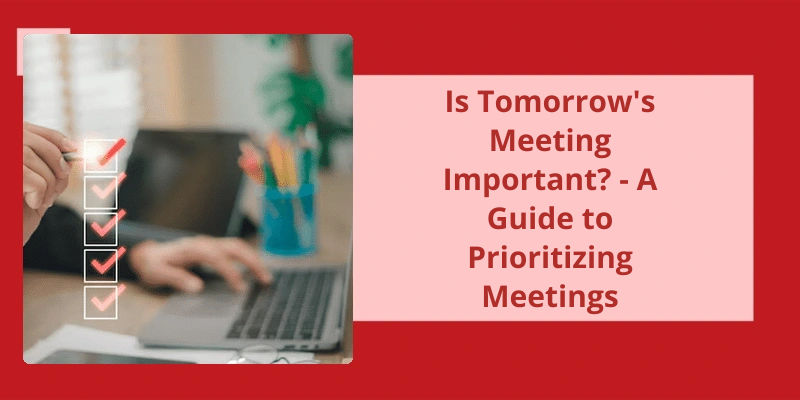The issue of whether tomorrow's meeting is crucial or not depends on a variety of factors. Firstly, the purpose of the meeting needs to be clearly defined and articulated. Is it a routine check-in to discuss ongoing projects and progress, or is it a critical decision-making gathering? Secondly, the attendees present play a crucial role in determining the significance of the meeting. Is the meeting composed of high-level executives or employees with the authority to make important decisions? Finally, the outcome of the meeting needs to be carefully evaluated to gauge it’s impact on future decisions and actions. Given the importance of these variables, it’s essential to carefully consider the meeting's significance before attending.
Is It Tomorrow’s Meeting or Tomorrows Meeting?
When it comes to grammar, there are many simple rules that can make a huge difference in how clear and readable your writing is. One of the most basic rules is when to use an apostrophe to indicate possession. In the case of tomorrow, it’s important to understand that it’s a singular noun, meaning it refers to one day. Therefore, when you want to indicate possession, you should use “tomorrows” with an apostrophe.
It might seem like a small detail, but using the correct apostrophe placement can make a big difference in how professional and polished your writing looks. It’s all too easy to make simple mistakes like forgetting to use an apostrophe or getting the placement wrong, but taking the time to get it right can help you stand out and make a positive impression on your readers.
Of course, grammar and punctuation rules are always evolving, so it’s important to stay up to date on the latest conventions. That said, the rule for tomorrows meeting versus tomorrows meeting isn’t likely to change anytime soon – just remember that when youre referring to something belonging to tomorrow, make sure to use an apostrophe before the “s.”
In summary, while it may seem like a small detail, using the correct grammar and punctuation can make a big difference in how professional your writing looks. Remembering this simple rule will help you avoid common mistakes and ensure that your writing is clear and easy to read. Whether youre writing a report for work, crafting a social media post, or sending an important email, taking the time to get the details right can pay off in a big way. So, go ahead and use “tomorrows” with confidence!
As every day ends, we look forward to what’s ahead, what tomorrow brings. It’s a word filled with wonder and hope, a promise of potential and possibilities. But what, exactly, does tomorrow mean? Is it simply the day following today or a representation of the future? In this article, we’ll delve into the meaning of tomorrow and explore it’s various interpretations.
What Is the Meaning of Tomorrow’s or Tomorrows?
Tomorrow’s or tomorrows refers to a specific period of time that follows the current day. It’s a term that’s used to describe a point in the near future, where events, situations, and circumstances are likely to occur. For most people, tomorrow is seen as a time filled with possibilities and opportunities, creating a sense of excitement and anticipation.
The future is a concept that’s both mysterious and exciting, as it represents a time that’s yet to come. People often use this word to describe their hopes, dreams, and ambitions, as they look towards what’s to come.
However, tomorrow’s or tomorrows can also be seen as a time of uncertainty. The future is unknown, and no one can predict what’ll happen next. This is why people often feel anxious or fearful when they think about the future. They worry about what might happen, what they might lose, and what kind of challenges they might face.
Despite the uncertainty that comes with tomorrow’s or tomorrows, many people still approach this period of time with a sense of hopefulness. They believe that the future will be better than the present, and that it will offer new opportunities for growth and success. This positive outlook is what drives many people to work harder, plan better, and stay motivated in the face of adversity.
It’s a time filled with both possibilities and uncertainties, creating feelings of excitement and apprehension. Despite the challenges and obstacles that may come their way, they remain motivated to work towards their goals and create a brighter and more fulfilling life.
Conclusion
Tomorrow's meeting isn’t just another mundane task to tick off the to-do list. It’s an opportunity to collaborate, brainstorm, and make strategic decisions that could impact the organization's future. It's a time to engage with our colleagues and exchange ideas that could lead to innovative solutions. The importance of this meeting can’t be overstated, and it’s crucial that we fully participate, ready to contribute our expertise and share insights. Let's approach this meeting with enthusiasm, recognizing it’s significance and making the most out of it – because ultimately, the success of our team and organization could hinge on what we accomplish together tomorrow.






